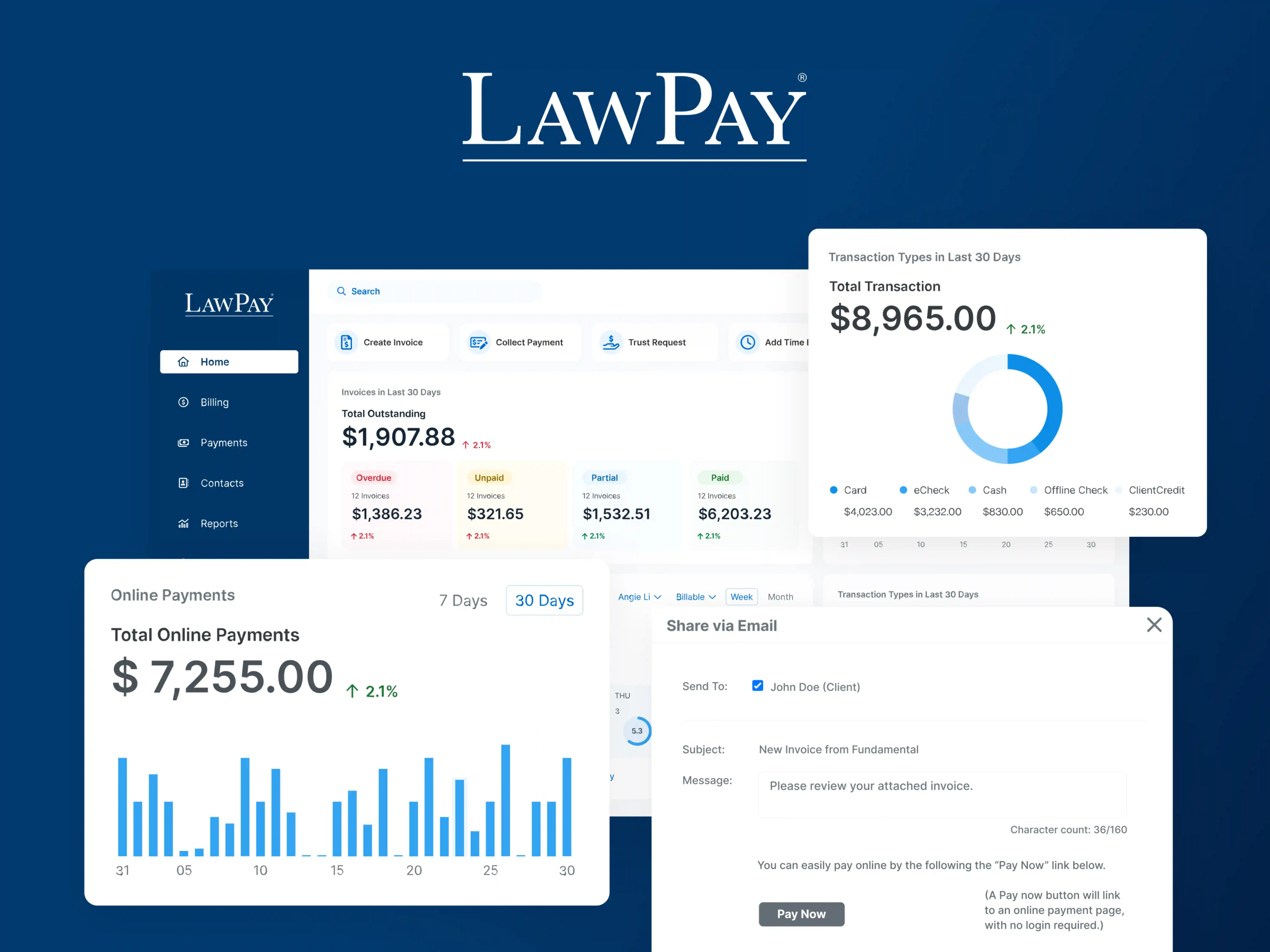Key takeaways
While hardworking attorneys invest countless hours in their clients’ cases, the effort can lose value if clients don’t pay their invoices.
When busy practices don’t have an effective law firm accounts receivable management process, unpaid client bills can become an issue. However, simply dedicating more staff to the problem isn’t the answer—and hiring a dedicated accounting team may not be a feasible option.
Therefore, to boost efficiency, productivity, and cash flow, law firms should focus on improving all aspects of their law firm’s accounts receivable (A/R) process. This may require automating invoicing or adding more accepted payment methods.
In this article, we’ll cover best practices to improve collections, the importance of an effective accounts receivable system, and challenges you can prevent with proper planning.
What Is Law Firm Accounts Receivable Management?
A law firm’s accounts receivable represents all outstanding client payments for completed and invoiced work.
Some law firms consistently maintain a high accounts receivable because of strict payment terms, unresponsive clients, or issues managing a tedious or complex accounts receivable system. As a result, some firms may wait to collect outstanding invoices at the end of the year.
Importance of Effective Law Firm Accounts Receivable Management
Maintaining a high number of unpaid invoices can impact a firm’s finances over time. If left unchecked, outstanding balances might outpace actual revenue—making it harder to make payroll and keep the lights on.
You also end up working for free—unpaid invoices will sit on your books until you turn them over to a debt collector or write them off. If you contact a collection agency, they may not take your past-due accounts until they’re past due for a certain period. They may also charge a portion of the recouped funds. Writing off the debt is worse—you essentially fund the cost of the client's legal services out of your pocket.
Adopting a more proactive, strategic, and streamlined law firm accounts receivable management process is a better option for the following reasons:
Improved cash flow: An effective accounts receivable management strategy will directly contribute to more consistent revenue. Making it easier to manage payments and consistently bill clients can significantly boost law firm cash flow.
Better client experience: An uncomfortable call or email about a bill or late payment can erode a client's sense of trust. Simplifying or automating your law firm’s accounts receivable process makes it easier for clients to make payments faster and creates a better overall experience.
More secure: Personally following up on billing and invoices can increase the chances of accidentally leaking sensitive information. Streamlining the processes and leveraging secure payment software makes it easier to accept payments while keeping client information safe.
Easier to maintain IOLTA and trust account compliance: Automation and other features of digital law firm accounts receivable management software make it significantly easier to avoid commingling funds.
In addition to implementing a more strategic accounts receivable management process, law firms can also measure collection rates to ensure the effectiveness of the A/R improvements.
How to Calculate Collection Rate
Your law firm’s collection rate is the percentage of invoiced amounts that clients have paid. To calculate your law firm's collection rate, divide total client payments by total amounts billed over the same timeframe. For this metric, using a longer timeframe to calculate (such as one year) will give you a more accurate idea of your firm’s financial health in the long term.
For instance, let’s say you've collected $90,000 in a given year, off of $110,000 in billings. That means your collection rate is 82%. We recommend shooting for 95% or higher.
Best Practices for Accounts Receivable Collections
If your law firm’s collection rate is less than 90%, the strategies below can help improve your accounts receivable process from start to finish and boost that rate.
1. Establish Expectations During Client Intake
Believe it or not, your accounts receivable process begins during the first meeting with the client.
New client consultations are crucial for understanding the client’s case and establishing early rapport. This meeting should include a detailed review of payment expectations and the billing process.
Here are key areas to consider during the client intake process that can help you establish the best expectations during consultations:
Determine whether you can realistically satisfy the client's needs and expectations. Provide the client with a roadmap of key milestones in the case. That roadmap should outline risks and potential issues preventing a successful outcome.
Ensure the client understands the cost and the law firm's expectation of payment. Ask directly how the client will fund your services. Describe the invoicing cadence, payment terms, and late-payment penalties. Sharing a sample attorney fee agreement can help illustrate what to expect from your firm.
Decide if the client is credible and a good risk. Listen to what the client tells you and note information that doesn't make sense. For example, if you learn you would be this client's fifth attorney, the case may be too high of a risk. Overall, trust your gut.
All in all, make it a goal that both you and the client are comfortable and confident in the other party's integrity (post-consultation) so the case starts off on a positive note.
2. Set Up Scheduled Payments
Setting up automatic payments can help clients budget accordingly, stay current with their invoices, and provide steady cash flow for your law firm.
The best time to pitch clients on scheduling payments is during intake. You can have them sign payment authorization forms and set up the payment plan from the get-go. From there, the payments will process automatically, without hands-on intervention from you or the client.
3. Accept Multiple Payment Methods
Requiring physical checks or in-person payments can create obstacles for your client. They might delay payment due to a low account balance, travel schedule difficulties (for in-person payments), or a short supply of stamps.
Providing multiple online payment options removes most of these obstacles by allowing more flexible payment methods. That’s why legal payment solutions, like LawPay, provide firms with a variety of ways to accept payments, including eCheck, credit cards, and other digital payment methods.
In addition to offering multiple payment methods, digital payment solutions also offer more flexibility with payment terms. Many unpaid bills result from clients simply not having enough money to cover the cost all at once. Electronic payments are also easy to adjust and customize without disrupting your law firm’s accounting processes.
4. Maintain Consistent Communication
Common complaints against lawyers include neglect and lack of communication. That is why regular client contact is one of the most important best practices for accounts receivable collections.
Keep in touch with your clients, even when nothing eventful happens. A phone call to say, "We're still waiting on…" is better than no contact at all. The more consistent you are with these client updates, the more you can control the narrative as the case progresses.
Consistent communication can also familiarize clients with the work listed on their invoice. This visibility can help minimize questions and potential disputes about work completed.
Take our continuing legal education (CLE) course about creating strong and effective client relationships to about the most common complaints against lawyers and how your firm can get ahead of them.
5. Create Straightforward Invoices
Legal invoices give the client visibility into the work you're completing on their behalf. Keep the language simple and avoid legal jargon. You can also include a summary for each task and opt to list individual tasks rather than group them under one large entry. All in all, you want the invoice to answer questions, not raise them.
6. Send Electronic Invoices
Manually preparing and sending invoices is tedious and time-consuming. If this manual process isn’t streamlined, it adds frustration for clients and delays payments.
With electronic invoices, you can more easily build and customize each, send them out as soon as they’re ready, and provide clients with an instant way to pay.
Electronic invoices also help firms save costs by eliminating time spent on preparing bills and reducing the use of paper and stamps. Plus, electronic payments are easy to schedule in advance, making it easy to set up future or recurring payments.
Download our guide, "The Billable Hour Reimagined," to learn more about billing best practices and how technology can help streamline your invoicing process.
7. Bill and Follow-Up with Clients Consistently
Delayed invoices can lead to late or missing payments from clients. As a result, both law firms and clients can struggle to budget accordingly when bills are inconsistently sent or sporadically paid.
For more internal and external predictability, follow these billing best practices:
Bill clients around the same day every month. Even better, aim to have your clients receive their monthly invoices three to four days after the first of the month. Since this is usually a pay period for most businesses, this increases the chances that the client will pay their bill more promptly.
Implement a disciplined follow-up process. If you send invoices on the 4th of every month, schedule a follow-up on your calendar for the week of the 18th.
Call or email every client who receives an invoice. Offer to review the billing and answer any questions the client has.
Call every client who has not paid a prior month's invoice and ask for payment. While these phone calls can be unpleasant, they are effective. If you're feeling reluctant, think about whether you'd rather ask for what you've earned or write off this client's balance.
8. Find a Legal Billing Solution
One of the biggest advantages of leveraging tech, like a legal billing and payment solution, is how it can digitally automate your end-to-end billing processes. Your attorneys will waste significantly less time calculating and sending invoices, following up with clients, and chasing payments.
Legal payment processors like LawPay are designed to seamlessly support your law firm’s accounts receivable process by bolstering your billing, compliance, and reconciliation procedures with automation, integrations, and user-friendly payment options. These solutions also support a more consistent invoicing process—leading to fewer payment reminders and other client follow-ups.
9. Address Aging Accounts
Implementing these collection practices for your law firm can dramatically improve your payment experience with new clients, but what about the old ones?
It may be tempting to ignore those old unpaid balances. Don't do it. Instead, devise a process before turning them over to a collection agency. Below is an example of the steps you can take:
Start by ceasing work if you haven't done so already.
Escalate the frequency of telephoned requests for payment. If you are calling once monthly on accounts under 30 days late, bump it up to once weekly for accounts over 30 days late.
Send a written notice that you'll turn the account over to collections when it reaches 90 days past due.
If those efforts don't result in payment, let the debt collector take over.
The Unique Challenges of Legal Accounts Receivable Management
No attorney wants to go unpaid. Unfortunately, the manual processes that many law firms use can make the management of legal accounts receivable difficult. Below are a few of the biggest challenges your firm should resolve.
Complex Billing Arrangements
Many attorneys tailor billing arrangements to fit each client’s unique circumstances. However, this can create a complex web of billing schedules and terms that can be a nightmare to keep straight. With only inflexible, manual processes to keep track of it all, it’s not surprising that some bills fall through the cracks.
Poor Retainer Management
When a law firm accepts payment for a legal retainer, they have access to a certain amount that they can bill against. But that doesn’t mean law firms have instant access to that money.
To maintain trust account compliance, an attorney can’t pay themselves from that retainer until the client reviews and accepts the bill. With heavy workloads and multiple clients, it can be easy to miss when a retainer balance is getting low.
Worse, if a client doesn’t know when their retainer balance is running out, they may be shocked when they’re suddenly handed a bill they didn’t expect.
Tedious Time Tracking
It’s up to the attorney to keep track of billable hours and communicate it to the client. When done by hand, this is incredibly time-consuming yet incredibly important.
To maintain trust account compliance, firms must be very careful about tracking billable work correctly to avoid commingling earned and unearned funds, which can further complicate the accounts receivable management process.
Slow, Outdated Client Service
Calling clients for payment follow-ups, sending snail mail, and other manual accounts receivable processes can create a lot of unwelcome stress and tension. If a practice has limited or inflexible payment options that make it inconvenient or difficult for clients to pay, it can worsen the situation.
A Better Way to Manage Your Law Firm’s Accounts Receivables
Revamping your law firm’s accounts receivable management strategy is the first step to improving collections and saving time. Finding an efficient payment solution can help your law firm maximize time and minimize mistakes.
LawPay is an industry-leading legal payment solution designed to help streamline the legal billing process. With powerful and flexible tools to accept and manage payments, LawPay helps lawyers automate and streamline their law firm’s accounts receivable process.
Below are a few of LawPay’s features:
Online Payments allows law firms to process transactions made with card, eCheck, and legal fee financing in one platform.
Quick Bill provides firms with an easy way to quickly create and send invoices to clients while tracking payment status.
Card Vault securely stores client card information while meeting PCI compliance.
Scheduled Payments allows your firm to set up one-time or recurring automatic charges to stored payment methods.
Schedule a demo to learn more.
Schedule a demo to see what LawPay can offer your firm.
Book Now
About the author

The LawPay Team
